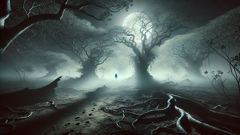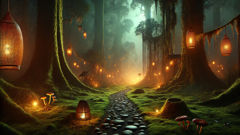Introduction
In the tangled heart of Paraguay’s Gran Chaco, where the night sings with the calls of unseen beasts and the moon rises heavy over the ceibo trees, stories move on the humid breeze. Among the Guarani, legends pass from mouth to mouth, each word shaped by fear, hope, and the shadow of memory. Of all these tales, none chills and captivates like that of the Luison—the cursed seventh son who roams the night as a creature torn between man and beast. This legend has seeped into every part of Paraguayan life, whispered by firesides and invoked in hushed warnings as the full moon waxes. For the Guarani people, the Luison is more than a werewolf: he is a symbol of the darkness inherited through family, the struggle against fate, and the longing for freedom.
Generations ago, in a rural village pressed between dense forest and swelling river, a family lived under the curse of a forgotten pact. Their story was shaped by the cycles of the moon and the changing seasons, each child’s birth a blessing or a portent. The villagers believed that the seventh son in any family was marked by ancient forces, especially if no daughters came before. Such a child, it was said, bore the touch of Tau—the evil spirit of Guarani lore—who sowed darkness in the world. At his birth, omens would gather: dogs would howl, cattle refuse to graze, and birds fall silent. Parents clung to superstitions, baptizing seventh sons by special rites or sending them far away, hoping to avert the inevitable transformation. Yet, in the village of Tavai, one family dared to hope that love and kindness might break the cycle, even as the world beyond their door grew restless with fear.
The legend of the Luison is woven with more than terror; it’s laced with sorrow, longing, and the desperate wish for redemption. This is the tale of Mateo, the seventh son of Tavai, whose journey from cursed child to hunted monster—and finally, to a man who seeks to heal the wounds of his past—captures the soul of Paraguay itself. Through the lush wilds and shadowed glades, Mateo’s story reveals not only the power of myth but the enduring strength found in forgiveness and belonging.
The Curse Awakens: Mateo’s Seventh Son
Mateo was born on a humid night when the river overflowed its banks and the cries of nightjars seemed sharper than ever before. His mother, Doña Lucía, had prayed for a daughter after six healthy sons, fearing the whispers and fearful glances that came with each new pregnancy. But when Mateo entered the world—her seventh boy—the old women of Tavai exchanged anxious looks, and a shiver ran through the village.
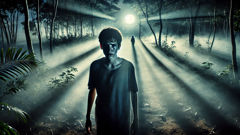
Mateo grew up a quiet child, more comfortable with the dogs that trailed him through the brush than with his brothers, who mocked his silent ways. There was something strange about him—his eyes, a deep shade of brown flecked with yellow, seemed to catch the light even in darkness. Animals grew restless when he drew near, and though he was gentle, neighbors muttered prayers as he passed.
Doña Lucía clung to hope. She begged the local priest for a special baptism, hoping holy water and prayer might break the curse. The ritual was performed in secret, but unease lingered. Mateo’s father, Don Ramón, grew stern, insisting that fate could be bent by hard work and discipline. Yet, at each full moon, Mateo’s sleep grew troubled. Nightmares haunted him—visions of blood, fur, and teeth. By age thirteen, the changes began. It started with feverish shivers and aching bones, then a gnawing hunger no meal could satisfy.
On the first full moon after his fifteenth birthday, Mateo woke in the jungle. His hands were raw, his mouth tasted of iron, and his shirt was shredded. He remembered nothing but a wild terror, a longing to run and hunt. The villagers found the carcass of a goat, torn as if by a great beast. Rumors spread, and the legend of the Luison slithered back into fearful conversation.
Mateo’s brothers kept their distance. Only his mother dared approach, offering herbal brews and gentle words. “You are still my son,” she whispered, clutching his trembling hands. But shame gnawed at Mateo’s heart. He feared he would bring ruin on them all.
The cycle repeated with each moon. Sometimes, Mateo chained himself in the barn, but still he woke with blood on his tongue and guilt in his chest. Villagers grew suspicious as livestock vanished. Don Ramón confronted him at last, his voice cracked with dread: “What are you, hijo?” Mateo had no answer. His loneliness grew deeper than the river.
One night, as the moon rose fat and golden, Mateo felt the beast stirring before sunset. He fled the village, desperate to protect his family from himself. The forest swallowed him whole, and there he began his exile—haunted, hungry, and hunted.
Wandering the Shadows: The Beast Within
The world beyond Tavai was endless and untamed. Jungle vines snagged Mateo’s clothes as he wandered beneath the ceibo and lapacho trees. The air pulsed with cicada song and distant howls. Each night, the beast inside grew bolder. Mateo’s memories became patchwork—half-dream, half-nightmare. When the moon was full, he awoke with blood-caked lips and aching limbs, his skin streaked with mud and torn by thorns. He feared what he’d done, but the hunger left little room for guilt.
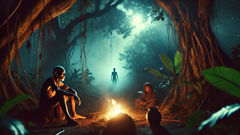
Yet, the jungle was alive with more than hunger and terror. It was also home to spirits and protectors—ancient Guarani beliefs lived on in its silence. Mateo began to sense the presence of shadowy watchers in the undergrowth. Once, while slaking his thirst at a river’s edge, he glimpsed a woman wreathed in mist, her hair tangled with river reeds. She sang softly in Guarani, her eyes sorrowful. Mateo knelt, trembling, as she spoke: “Your curse is old, hijo de la luna. But no curse lasts forever. Seek forgiveness—in yourself and in those you harm.”
Days blurred into weeks. Mateo survived on wild fruit and the occasional small animal. His body grew lean and strong, his senses sharpened. But the loneliness gnawed deeper than hunger. When storms lashed the forest, he huddled beneath roots, shivering as lightning clawed the sky. Some nights, he watched distant fires from the hills, yearning for voices and warmth.
In the dark heart of the jungle, legends said the spirit Tau wandered freely. Mateo dreamed of Tau—a figure both monstrous and familiar—who taunted him with visions of his family’s suffering. “You are mine,” Tau whispered. “You cannot run from what you are.” Mateo awoke screaming, soaked in sweat. Yet, he clung to the river-woman’s words: forgiveness might set him free.
One day, battered by hunger and exhaustion, Mateo stumbled upon a clearing ringed by ancient stones. In its center burned a small fire. An old man sat beside it, eyes sharp as obsidian. “You carry a heavy burden,” the man said without turning. “But even a beast may choose its path.” He introduced himself as Tupa’i, a Guarani shaman.
Tupa’i took Mateo in, offering food and cryptic wisdom. “Your curse is tied to the wounds of your ancestors,” he explained. “The Luison was not always a monster—it was a protector twisted by pain and betrayal. If you face your fear and seek healing, you may change your fate.”
Mateo listened, torn between hope and despair. He learned from Tupa’i—herbal lore, prayers to the spirits, how to listen to the heart of the forest. Yet, when the moon grew full, the beast’s hunger always returned. One night, unable to resist, Mateo fled the shaman’s camp and vanished into the wild, his howl echoing through the trees.
Hunted by Fear: The Villagers’ Pursuit
Word spread through the villages of a beast haunting the night. Livestock vanished, strange prints marked riverbanks, and mothers kept their children close after dark. Some swore they saw a creature—half-wolf, half-man—skulking near the cornfields or slipping between the ceibo trees at dusk. Others spoke in whispers of old curses and the evil spirit Tau. Fear thickened like fog across the countryside.
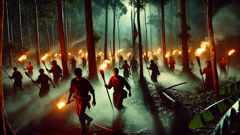
Mateo became the target of every suspicion. Though he rarely approached human settlements, hunger sometimes drove him close. He stole chickens and goats, always careful not to harm people. Still, the villagers’ fear grew feverish. Don Ramón, Mateo’s father, endured their anger with downcast eyes. “My son is lost,” he told them, though his heart broke with each word.
One night, a search party gathered—young men bearing torches, machetes, and silvered blades blessed by the priest. They combed the jungle, calling out for the beast, eager to end the terror. Mateo watched them from the shadows, torn between longing and dread. He recognized old friends among them, his brothers among the hunters.
As the searchers pressed deeper into the wilds, disaster struck. A storm erupted, fierce and sudden, scattering the men. One of Mateo’s brothers, Tomas, slipped on wet rocks and fell into a ravine. Mateo heard his cry above the wind and raced to help. For a moment, instinct warred with fear—the beast inside urged him to flee. But something stronger held him back.
With unnatural strength, Mateo hauled Tomas to safety, dragging him clear of the floodwaters. Tomas, dazed and frightened, caught a glimpse of his brother’s half-changed face—eyes aglow, teeth sharp, body hunched with wildness. He recoiled in horror.
“You’re… you’re the Luison,” Tomas gasped.
Mateo hung his head. “I am still your brother.” He fled before Tomas could speak again, heart pounding with shame and sorrow.
Tomas staggered back to the village and told his tale. Some dismissed him as fever-mad; others believed every word. The priest declared the land cursed and urged greater vigilance. Fires burned through the night as villagers prayed for deliverance.
But not all hearts were hardened by fear. Doña Lucía never gave up hope. Each night she left food at the edge of the jungle—fruit, bread, a folded shirt. Sometimes, footprints appeared near the offerings, vanishing into the mist.
Conclusion
Seasons shifted, and the village’s fear slowly turned to legend once more. Some claimed to hear the Luison’s howl on stormy nights, while others insisted he had vanished into myth. In truth, Mateo remained close, drawn by memories of family and the hope that someday he might return. He found solace in the lessons of Tupa’i, learning that redemption was not a single act but a path walked every day.
Years passed, and Tavai changed. New children were born, old wounds faded, and stories softened at their edges. Mateo’s brothers grew into fathers themselves, teaching their own sons the lessons of compassion and courage. Doña Lucía’s faith endured; she continued to leave offerings at the forest’s edge until her final days. It was said that on the night she died, a great wolf sat vigil beneath her window, eyes glimmering with sorrow—and when dawn broke, it was gone.
The legend of the Luison lived on, not only as a warning but as a testament to forgiveness and the enduring strength of family. Mateo’s fate was never fully known. Some say he found peace at last and shed his curse beneath a forgiving moon; others believe he wanders still, watching over those who remember his name. For in every shadowed grove and every whispered tale, the Luison’s story reminds us: even in the depths of darkness, redemption is possible when love endures.

